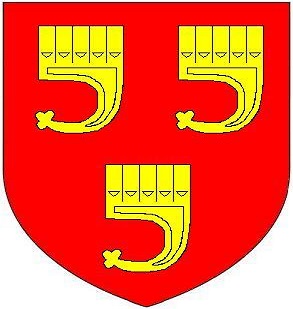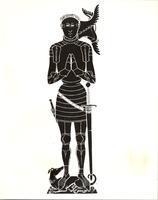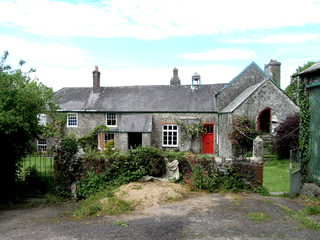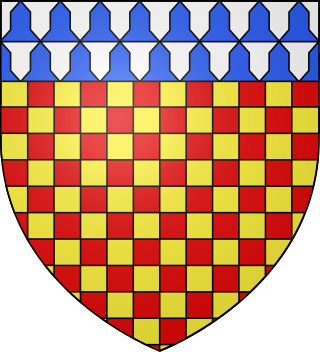
John Beaumont, 4th Baron Beaumont KG (1361–1396) was an English military commander and Admiral who served in the Hundred Years' War against the partisans of Antipope Clement VII.

Umberleigh is a former large manor within the historic hundred of (North) Tawton, but today a small village in North Devon in England. It used to be an ecclesiastical parish, but following the building of the church at Atherington it became a part of that parish. It forms however a part of the civil parish of Chittlehampton, which is mostly located on the east side of the River Taw.

Sir John Basset, of Tehidy in Cornwall and of Umberleigh in Devon was Sheriff of Cornwall in 1497, 1517 and 1522 and Sheriff of Devon in 1524. Although himself an important figure in the West Country gentry, he is chiefly remembered for his connection with the life of his second wife and widow Honor Grenville, who moved into the highest society when she remarried to Arthur Plantagenet, 1st Viscount Lisle KG, an illegitimate son of King Edward IV, and an important figure at the court of King Henry VIII, his nephew.

Sir Hugh I Courtenay, of Haccombe in Devon, was Sheriff of Devon for 1418/19 and was thrice elected knight of the shire for Devon in 1395, 1397 and 1421. He was a grandson of Hugh de Courtenay, 2nd/10th Earl of Devon (1303–1377), was the younger brother of Edward de Courtenay, 3rd/11th Earl of Devon (1357–1419), "The Blind Earl", and was the grandfather of Edward Courtenay, 1st Earl of Devon (d.1509), KG, created Earl of Devon in 1485 by King Henry VII. He was the link between the senior line of the Courtenay Earls of Devon made extinct following the Battle of Tewkesbury in 1471 and the post-Wars of the Roses creation of a new Earldom for his grandson made in 1485 by King Henry VII.

Members of the Basset family were amongst the early Norman settlers in the Kingdom of England. It is currently one of the few ancient Norman families who has survived through the centuries in the paternal line. They originated at Montreuil-au-Houlme in the Duchy of Normandy.

The Chapel of the Holy Trinity at Umberleigh is a ruinous mediaeval chapel in north Devon, England, largely demolished according to Lysons (1822) in about 1800. It stands next to Umberleigh House, the manor house of Umberleigh, which still survives in the form of a large Georgian farmhouse. The ruins together with the adjoining Umberleigh House were granted a Grade I listed status on 25 February 1965. According to Tristram Risdon (d.1640) the Devon historian, the site was originally a royal palace of the Saxon King Athelstan and was later a mediaeval mansion house by successive inheritance of the Solery, Champernoun, Willington, Beaumont and Bassett families. The chapel, manor house and estate of 400 acres with 7 cottages is today the property of the Andrews family, which purchased the freehold of the property in 1917 but had been long-standing tenants of the Bassett family from about 1840. The south wall of the chapel survives and today forms the back wall of an outbuilding used for general storage.

Whitechapel is an ancient former manor within the parish of Bishops Nympton, in north Devon. It was the earliest known residence of the locally influential Bassett family until 1603. The core of the present manor house is late 16th or early 17th century, with later additions and alterations, and was classed as Grade I listed on 9 June 1952.
The Manor of Loxhore was a manor in the parish of Loxhore, North Devon, England.

Hall is a large estate within the parish and former manor of Bishop's Tawton, Devon. It was for several centuries the seat of a younger branch of the prominent and ancient North Devon family of Chichester of Raleigh, near Barnstaple. The mansion house is situated about 2 miles south-east of the village of Bishop's Tawton and 4 miles south-east of Barnstaple, and sits on a south facing slope of the valley of the River Taw, overlooking the river towards the village of Atherington. The house and about 2,500 acres of surrounding land continues today to be owned and occupied by descendants, via a female line, of the Chichester family. The present Grade II* listed neo-Jacobean house was built by Robert Chichester between 1844 and 1847 and replaced an earlier building. Near the house to the south at the crossroads of Herner the Chichester family erected in the 1880s a private chapel of ease which contains mediaeval woodwork saved from the demolished Old Guildhall in Barnstaple.

Sir Hugh Courtenay of Boconnoc in Cornwall, was twice a Member of Parliament for Cornwall in 1446–47 and 1449–50. He was beheaded after the Battle of Tewkesbury in 1471, together with John Courtenay, 7th Earl of Devon, the grandson of his first cousin the 4th Earl, and last in the senior line, whose titles were forfeited. His son Edward Courtenay, 1st Earl of Devon, was created Earl of Devon in 1485 by King Henry VII, following the Battle of Bosworth and the closure of the Wars of the Roses.

Richard Coffin (1456–1523) of Alwington and Heanton Punchardon in North Devon, was a Sheriff of Devon.
The Manor of Shirwell was a manor in North Devon, England, centred on the village of Shirwell and largely co-terminous with the parish of Shirwell. It was for many centuries successively the seat of two of the leading families of North Devon, the Beaumonts and their heirs the Chichesters of Raleigh, Pilton, both of which families were seated at the estate of Youlston within the manor of Shirwell. The manor house which survives today known as Youlston Park is one of the most architecturally important historic houses in North Devon and exists largely in its Georgian form, but retains many impressive late 17th-century interiors.

John Basset (1518–1541) was a young English gentleman from Devon, a member of the old Basset family, and heir to a substantial inheritance. His short life is well documented in the Lisle Papers. He studied law at Lincoln's Inn and at the age of 20, at the start of a promising career, entered the household of Thomas Cromwell, Lord Privy Seal, but died suddenly aged only 23, albeit having married and produced a son and heir, born posthumously. His stepfather and father-in-law was Arthur Plantagenet, 1st Viscount Lisle (d.1542), Lord Deputy of Calais 1533–1540, a bastard son of King Edward IV and thus uncle of King Henry VIII, whose arrest with that of his mother in 1540 at Calais for heresy and treason, was a major, potentially catastrophic, event in his life. He died a year after the arrests, from an unknown illness, but his siblings all went on to have successful careers, especially his younger brother James, mostly as royal courtiers, apparently unaffected by the crisis.

The manor of Bideford in North Devon was held by the Grenville family between the 12th and 18th centuries. The full descent is as follows:

Philip Beaumont (1432–1473), lord of the manors of Shirwell in North Devon and of Gittisham in East Devon, was a member of parliament for a constituency in Devon and was Sheriff of Devon in 1469. He was the rightful heir of his elder brother William Beaumont (1427–1453), a substantial landholder, but faced claims to his inheritance from his bastard nephew, John Bodrugan, "The Beaumont Bastard", the illegitimate son of Joan Courtenay, William's wife.
William Beaumont (1427–1453) was lord of the manor of Shirwell in North Devon and a substantial landholder in Devon.

Sir John St Leger of Ulcombe in Kent, was Sheriff of Kent in 1430 and 1433.

Woolleigh is an historic estate in the parish of Beaford, Devon. The surviving mansion house known as Woolleigh Barton, situated 1 3/4 miles north-west of the parish church of Beaford, is a grade II* listed building, long used as a farmhouse. It incorporates remains of a "very fine example of a late Medieval manor house" and retains a "very rich" 15th century wagon roof, a garderobe with the original door, and an attached private chapel with a 17th-century roof.

Richard Chichester (1423-1496), lord of the manor of Raleigh in the parish of Pilton, near Barnstaple, North Devon, was twice Sheriff of Devon, in 1469 and 1475.
The Manor of Heanton Punchardon was a manor in the parish of Heanton Punchardon, Devon, England.






















